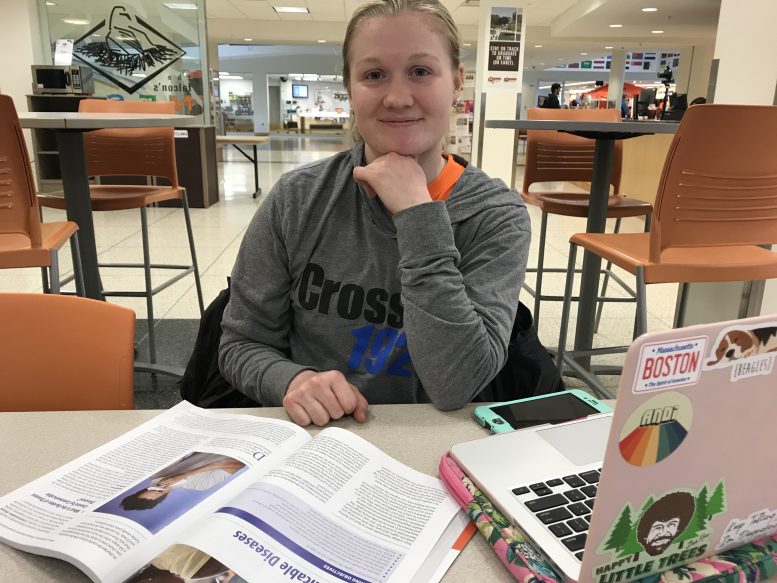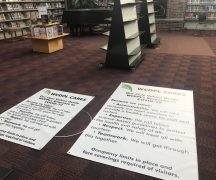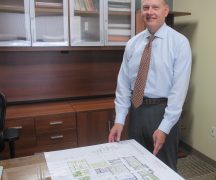By DAVID DUPONT
BG Independent News
Brianna Goodwin is sitting in the Bowen-Thompson Student Union on campus studying.
Her lap top is out and her public health textbook is open in front of her. She’s looking at the chapter on Communicable Diseases, an odd coincidence given how her life as a student and those of her peers is on the brink of being upended by concerns over the coronavirus.
Today spring break starts at Bowling Green State University. Students will leave campus under a cloud of uncertainty. When classes resume they will be offered online, with the expectation that regular face-to-face classes starting again on April 7.
***
***
This is all part of BGSU’s reaction to the emergence of the novel coronavirus that causes COVID-19.
Goodwin, who commutes from her home in Fremont, said she’s not happy to have all her classes go online. Too much information comes out within the traditional class format, and she wonders if some of that will be lost with an online course. It’s also uncertain how her physics lab will be managed. Goodwin, a senior majoring in communication disorders, is no stranger to online courses — that’s how two of her five courses are delivered.
Yet, as someone who works in a nursing, she said, “I know how important it is for older adults and how at risk they are.” That includes her grandparents, and the father of her boyfriend who are already struggling with serious medical conditions.
Though students will be able to return to campus on March 23, the end of spring break, she will not, opting to stay home.
Rajdeep Reddy Charla, a first year graduate student in computer science, will be back on campus. Extending his time away is not an option — all his plans are made. Charla, from India, plans to visit relatives in Kansas City over the break.
He’s not concerned about courses moving online. It’s mostly theoretical material, and faculty can share the slides used in class presentation.
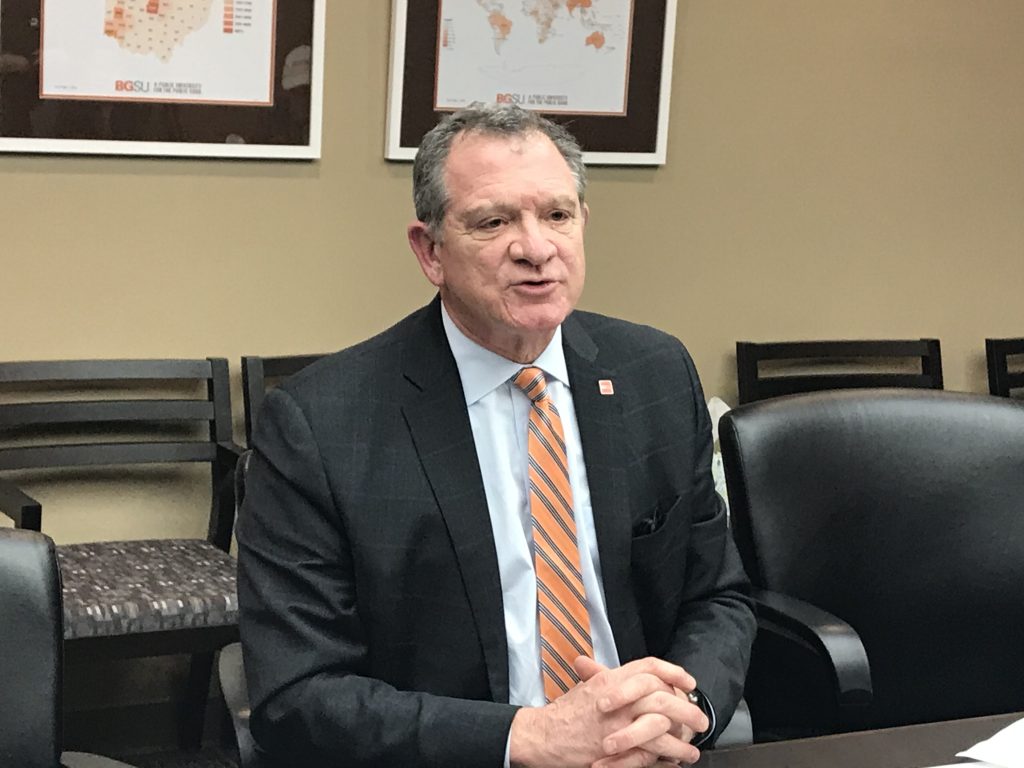
In his press conference this week, President Rodney Rogers said the university is offering training to faculty, who may not be used to teaching online.
And faculty are reaching out and helping each other, said David Jackson, president of the BGSU Faculty Association. “There’s a wide range of experiences in terms of what people had in terms of teaching online. We haven’t been flooded with concerns.” Faculty members are discussing the issue, and coming up with practical approaches through the faculty listserv.
Jackson said that the administration has been working well with the faculty. “Decisions are really outside the university’s hands,” he said. The die was cast when Ohio State canceled face-to-face classes, and then the governor took a strong stand about closures.
“No one wanted to be the school that stays open and then an outbreak occurs. It’s a legitimate, bona fide, public health emergency that the university is handling the best it possibly can,” Jackson said.
Rogers said the university’s actions are in line with the recommendations of public health agencies in an effort to stem the spread of the virus while still fulfilling its mission to educate students.
The goal of moving online is to make sure students stay on track toward graduation whether that’s this May or further in the future.
“We’re going to maintain the academic integrity of our program and continue to educate our students,” Rogers said.
Mentoring and tutoring will continue to be offered with “appropriate social distancing.”
Rogers added: “The health of our community is our number one concern, and we want to make sure our students complete their degrees in a timely way and that no student loses progress toward degree completion.”
Graduation is scheduled for May 15 and 16.
The university has “redoubled its efforts” in cleaning residence halls and dining facilities. Deep cleaning will be done over the break, and changes in how food is served in dining facilities that now use buffet lines are being implemented.
“The important thing is for us to take responsibility for our own health and make sure we follow good public health guidance, and make sure we maintain appropriate distances and know the symptoms,” Rogers said.
The university will engage in a public information campaign to get that message across.
For all this, there’s still uncertainty, Rogers said. That includes what happens when April 7 rolls around and face-to-face classes and activities are set to resume.
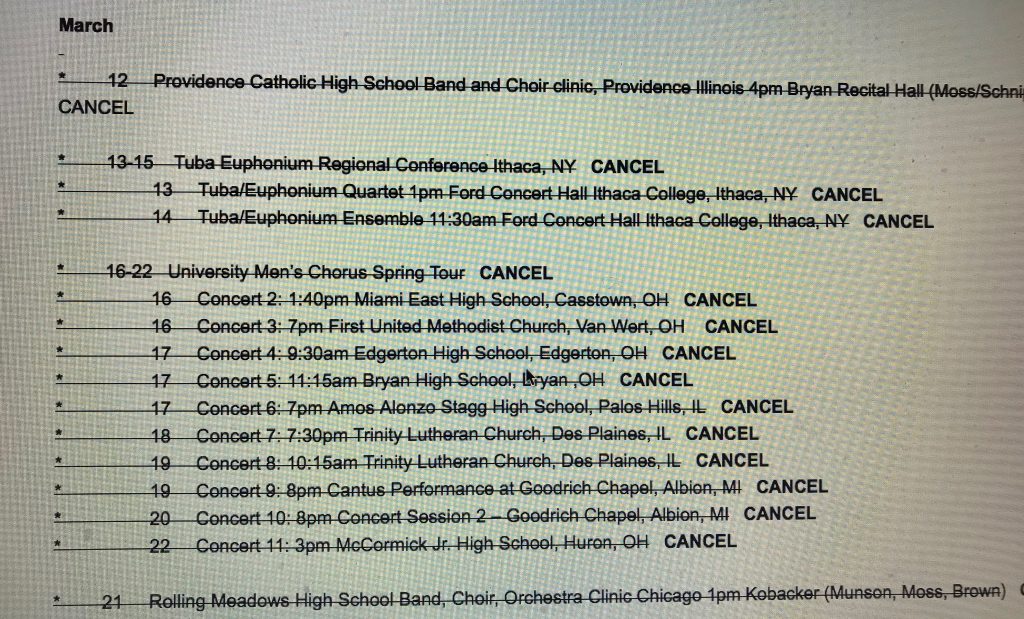
Among the most hard hit by the changes on campus will be the university’s musicians.
The chamber orchestra scheduled for March 30, the Wayland Chamber Music Competition scheduled for March 29, and the spring opera on April 3 and 5 are canceled.
William Mathis, dean of the College of Musical Arts, said that efforts will be made to find spots on other performances for ensembles that have been preparing for the Wayland Competition.
It’s a disappointment for students who have been preparing for these events, now to have them not happen.
Rogers, who majored in music as an undergraduate, said he understands the disappointment, even sorrow, of the performers, as well as their families, with the show not being able to go on.
The same holds true, he said, for athletes who have had their seasons curtailed.
Mathis said efforts are being made to reschedule student recitals that are required for students’ degree programs.
Those have to fit into what is already a very tight time frame.
Also, a victim of the coronavirus is the Men’s Chorus spring tour that would have taken the singers to schools in Ohio, Illinois, and Michigan. That was originally prompted by the host schools calling off the performances, said Keith Hofacker, the college’s technical director.
The situation continues to develop as policies on how to handle labs and other activities, including individual lessons have not been firmed up.
The individual lessons could be done using Skype.
More clarity on those issues is expected next week.
At the School of Art, Charles Kanwischer, director of the school, said that the exhibitions featuring the work of graduating seniors and masters degree students are expected to be presented as planned, but the receptions and any other public events may have to be canceled.
Faculty who teach studio classes are developing two weeks worth of lessons that can be completed remotely. For some media, work on projects can be done at home, but some such as ceramics, sculpture, and glassblowing require the facilities on campus.
Bonnie Mitchell, who teaches digital art in the school, said that computer labs will remain open, staffed by faculty, to allow students to continue working on projects.
Some of them do not have computers capable of operating the graphic programs they need.

